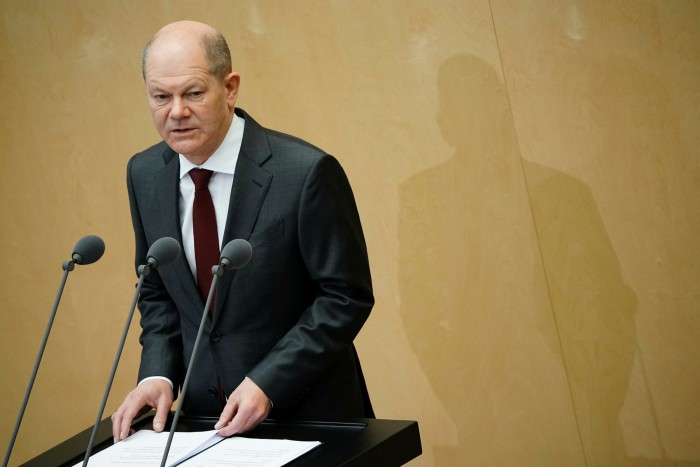Scholz plans last-ditch appeal to Putin in effort to stop attack on Ukraine
Olaf Scholz, German chancellor, is preparing to launch a last-ditch attempt to deter Vladimir Putin from invading Ukraine, after US officials warned that Russia was on the brink of launching a major attack on its western neighbour.
His preparations came as western nations continued to withdraw diplomatic and military personnel from Ukraine and some airlines cancelled or diverted flights to the country, while others said they were reviewing their schedules.
The US said on Saturday that it was evacuating staff from its Kyiv embassy and several nations urged their citizens to leave. Some European countries are preparing to receive a flood of refugees in the event of military action.
Scholz will travel to Kyiv on Monday before arriving in Moscow on Tuesday. Officials in Berlin said Germany had not given up hope that diplomacy could avert a war, although they played down expectations of a breakthrough.
“I don’t assume that we’ll come out of this with some kind of concrete result,” said one senior government official. But he insisted that “now is not the time for resignation”. The big goal for Scholz was, he said, to “get a better understanding of Russia’s goals, and to try to figure out if there are any ways back to direct dialogue”.
US intelligence assessments estimate that Russia could launch a full-scale invasion in the coming days. Though the White House believes Putin has not made a final decision, Russia has built up more than 130,000 troops along its border with Ukraine and in neighbouring Belarus, as well as weaponry that could be used for an assault on Kyiv.
Scholz will hold talks with Volodymyr Zelensky, Ukraine’s president, on Monday and is likely to offer more German economic aid. Berlin has provided almost €2bn in aid to Kyiv since 2014.

The official said the German government was also considering Ukraine’s requests for military equipment, although Scholz was unlikely to promise any new supplies on Monday.
The official added that Scholz would urge Putin to de-escalate the situation on the Ukraine border. He would also convey “how grave the consequences of an attack would be” in terms of sanctions on Russia, and stress “that one should not underestimate the unity of the EU, US and UK”.
According to the official, the talks with Putin were designed to explore the opportunities for “direct dialogue” between Russia and the west, possibly via existing formats such as the Organization for Security and Co-operation in Europe and the Nato-Russia Council, and seeking to make progress on implementing the Minsk agreement, aimed at resolving the conflict in the east Ukrainian regions of Donetsk and Luhansk, now controlled by Russia-backed separatists.

On the ground, US citizens serving in the OSCE’s monitoring mission were reported by Reuters to be in the process of evacuating from Donetsk. OSCE officials did not confirm or deny the report. Russia said the OSCE leadership told members that “a number of countries” had decided to withdraw members and this was a cause for “serious concern”. Foreign ministry spokeswoman Maria Zakharova called on the OSCE to avoid being “manipulated” and “dragged into sordid political games”.
Flight mapping software on Sunday appeared to show several airlines, including British Airways, avoiding Ukrainian airspace. British Airways declined to comment.
The Ukrainian low-cost airline SkyUp said on Sunday that it had diverted a flight from Madeira, Portugal, to land in the Moldovan capital of Chisinau after the aircraft’s Irish lessor banned it from entering Ukrainian airspace. Germany’s Lufthansa said: “A suspension of air traffic is being examined.”
Dutch airline KLM announced on Saturday that it was cancelling Ukraine flights and would avoid the country’s airspace. Low-cost carrier Wizz Air said its flights to Ukraine were still operating and that it was monitoring the situation. Ryanair, which also operates flights to Ukraine, declined to comment.
Israel said its national carrier El Al would lay on additional flights to bring home its 15,000 citizens in Ukraine. Families of Israeli diplomats were being evacuated, a foreign ministry official said.
Mykhailo Podolyak, an adviser at Zelensky’s office, told the Financial Times the airlines’ actions were “nonsense” that “resembles a kind of partial blockade”.
“Ukraine sees no point in closing the sky,” he said, adding that “the threat is from the Russian Federation, but Russia is not subject to such an outright blockade of its airspace?”
Countries neighbouring Ukraine have been preparing to receive refugees in the event of a full-scale Russian invasion. Diplomats said the European Commission was working on a range of options for financial and logistical support.
However, Brussels has refused to comment publicly on its plans as it does not believe war is inevitable.
Washington has predicted up to 5mn people could cross Ukraine’s western border. Derek Chollet, counsellor at the US state department, said he discussed the “potential for a refugee crisis” during a trip to Europe over recent days. He told reporters in Romania on Thursday: “The level of preparation at this point is at a fairly positive level.”
Additional reporting by Andy Bounds in Brussels and Mehul Srivastava in Tel Aviv
For all the latest Business News Click Here
For the latest news and updates, follow us on Google News.
